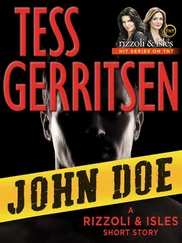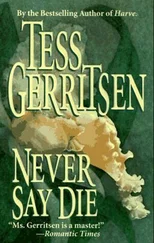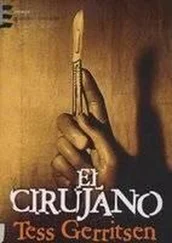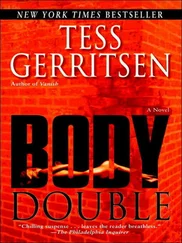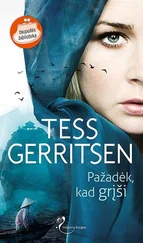“What do you tell them?”
“Never to blame themselves. Not to feel guilty. Because we bear responsibility for our own actions alone. Not for anyone else’s.”
She didn’t understand why her answer made his head suddenly droop. He ran a hand across his eyes, a quick, embarrassed swipe that left a glistening streak on his face.
“Rat?” she asked softly.
“I do feel guilty.”
“No one knows why she did it.”
“Not about Dr. Welliver.”
“Then who?”
“Carrie.” He looked at her. “It’s her birthday next week.”
His dead sister. Last winter, the girl had perished, along with their mother, in a lonely Wyoming valley. He seldom talked about his family, seldom talked about anything that had happened during those desperate weeks when he and Maura had fought to stay alive. She thought he’d put the ordeal behind him, but of course he hadn’t. He is more like me than I realized, she thought. We both bury our sorrows where no one can see them.
“I should have saved her,” he said.
“How could you? Your mother wouldn’t let her leave.”
“I should have made her leave. I was the man in the family. It was my job to keep her safe.”
A responsibility that should never fall on the shoulders of a mere sixteen-year-old boy, she thought. He might be as tall as a man, with a man’s broad shoulders, but she saw a boy’s tears on his face. He swiped them with his sleeve and glanced around for tissues.
She went into the adjoining bathroom and unspooled a wad of toilet paper. As she tore it off, a sparkle caught her eye, like glittering bits of sand scattered on the toilet seat. She touched it and stared at white granules adhering to her fingers. Noticed that there were more granules sparkling on the bathroom tiles.
Something had been emptied into the toilet.
She went back into the office and looked at the tea tray on the side table. Remembered how Anna had brewed herbal tea in that china pot and poured three cups. Remembered that Anna had added three generous teaspoons of sugar to her own cup, an extravagance that had caught Maura’s eye. She lifted the lid to the sugar bowl. It was empty.
Why would Anna pour the sugar into the toilet?
The telephone rang on Anna’s desk, startling both her and Julian. They glanced at each other, both rattled that someone was calling a dead woman.
Maura answered it. “Evensong School. This is Dr. Isles.”
“You didn’t call me back,” said Jane Rizzoli.
“Was I supposed to?”
“I left a message with Dr. Welliver hours ago. Figured I’d better try again before it got too late.”
“You spoke to Anna? When?”
“Around five, five thirty.”
“Jane, something awful’s happened, and—”
“Teddy’s okay, right?” Jane cut in.
“Yes. Yes, he’s fine.”
“Then what is it?”
“Anna Welliver is dead. It looks like a suicide. She jumped off the roof.”
There was a long pause. In the background, Maura could hear the sound of the TV, running water and the clatter of dishes. Domestic sounds that made her suddenly miss her own home, her own kitchen.
“Jesus,” Jane finally managed to say.
Maura looked down at the sugar bowl. Pictured Anna emptying it into the toilet and walking back into this room. Opening the roof door and stepping outside, to take a short walk to eternity.
“Why would she commit suicide?” asked Jane.
Maura was still staring at the empty sugar bowl. And she said: “I’m not convinced she did.”
TWENTY-TWO

ARE YOU SURE YOU WANT TO BE HERE FOR THIS, DR. ISLES?”
They stood in the morgue anteroom, surrounded by supply cabinets filled with gloves and masks and shoe covers. Maura had donned a scrub top and pants from the locker room, and she was already tucking her hair into a paper cap.
“I’ll send you the final report,” said Dr. Owen. “And I’ll order a comprehensive tox screen, as you suggested. You’re welcome to stay, of course, but it seems to me …”
“I’m only here to observe, not interfere,” said Maura. “This is entirely your show.”
Beneath her bouffant paper cap, Dr. Owen flushed. Even under harsh fluorescent lights it was a youthful face with enviably smooth skin that had no need for all the camouflaging creams and powders that had started to creep into Maura’s bathroom cabinet. “I didn’t mean it that way,” said Dr. Owen. “I’m just thinking about the fact you knew her personally. That has to make this hard for you.”
Through the viewing window, Maura watched Dr. Owen’s assistant, a burly young man, assembling the instrument tray. On the table lay the corpse of Anna Welliver, still fully dressed. How many cadavers have I sliced open, she wondered, how many scalps have I peeled away from skulls? So many that she had lost track. But they were all strangers, with whom she shared no memories. She had known Anna, though. She knew her voice and her smile and had seen the gleam of life in her eyes. This was an autopsy any pathologist would avoid, yet here she was, donning shoe covers and safety glasses and mask.
“I owe this to her,” she said.
“I doubt there’ll be any surprises. We know how she died.”
“But not what led up to it.”
“This won’t give us that answer.”
“An hour before she jumped, she was acting strangely on the phone. She told Detective Rizzoli that food didn’t taste right. And she saw birds, strange birds, flying outside her window. I’m wondering if those were hallucinations.”
“That’s the reason you asked for the tox screen?”
“We didn’t find any drugs in her possession, but there’s a chance we missed something. Or she hid them.”
They pushed through the door into the autopsy room, and Dr. Owen said: “Randy, we’ve got a distinguished guest today. Dr. Isles is from the ME’s office in Boston.”
The young man gave an unimpressed nod and asked: “Who’s going to cut?”
“This is Dr. Owen’s case,” said Maura. “I’m just here to observe.”
Accustomed to being in command in her own morgue, Maura had to resist the urge to claim her usual place at the table. Instead she stood back as Dr. Owen and Randy positioned instrument trays and adjusted lights. In truth, she did not want to move any closer, did not want to look into Anna’s face. Only yesterday she had seen awareness in those eyes, and now the absence of it was a stark reminder that bodies are merely shells, that whatever constituted a soul was fleeting and easily extinguished. Emma Owen was right, she thought. This isn’t an autopsy I should watch.
She turned instead to the preliminary X-rays hanging on the light box. As Dr. Owen and her assistant undressed the corpse, Maura stayed focused on images that had no familiar face. Nothing in these films surprised her. Last night, just by palpation, she had detected depressed fractures of the left parietal bone, and now she saw the evidence in black and white, a subtle spider’s web of cracks. She turned next to the rib cage where, even through the vague shadows of clothing, she spotted massive fracturing of ribs two through eight on the left. The force of free fall had fractured the pelvis as well, compressing the sacral foramen and cracking apart the ramus of the pubic bone. Exactly what one would expect to see in a body dropped from a height. Even before they sliced open the chest, Maura could predict what they would find in the thoracic cavity because she had seen the results of free fall in other bodies. While a fall might crack ribs and crush a pelvis, what ultimately killed was the force of abrupt deceleration tugging on heart and lungs, ripping delicate tissues and tearing great vessels. When they sliced open Anna’s chest, they would most likely find it filled with blood.
Читать дальше


